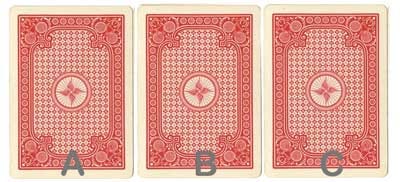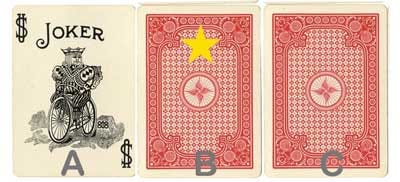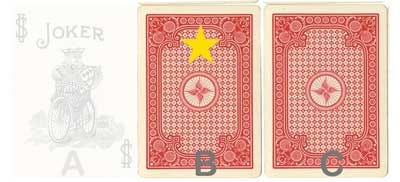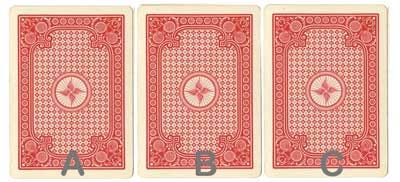Solution To The Kind-Hearted Magician --- REVEALED!
Kip Hansen last week gave us the following scenario (which I've pared to bare essentials here, but check the original if you fret):
START
Sam shows us three cards, two Jokers and one Ace, then lays them on the table, face down and swirls them around a lot, mixing them up.

Sam then tells his Dupes that he will pay them $10 if they can “find the Ace”, and if they fail, they pay him $10. (Sounds a lot like street-side Three Card Monte doesn’t it?) The Dupes pick the middle card and the Magician puts a little Yellow Star sticker on it, but the Magician doesn’t turn it over yet.

The Magician takes pity on them and says, “Look, this card is a Joker”, and turns over the card on the left, leaving two cards – the one the Dupes picked and one other. Sam asks “Now, do you want to stick to your choice – card B? Or switch to the other one, card C?
Now, our Kind-hearted Magician, says “I can’t bring myself to cheat such a nice young couple. When you first picked, you had only a one-in-three chance of being right and winning $10. I’d like to improve your odds to make it fair. Here’s what I’ll do, using my Magic Wand as an Event Eraser, I’ll wave it over the cards like this . . . (waving wand slowly over the three cards now on the table) . . . and erase the last few minutes of time, when you were picking from three cards.”

Sam waves the Magic Wand and lo-and-behold the Joker on the left, in position A, begins to fade from sight leaving just a little shadow. “That’s better,” Sam says, “now, would you like to move your Yellow Star sticker to card C or leave it on card B?” If your star is on the Ace, then you win $10, and if on the Joker, you pay me $10.”
FINISH
First, the three-card Monte. It's always a trick. The odds are based on information hidden to you. You cannot win. Anybody that wins is a plant. But, on the rare chance you do win, because the "performer" slips up (it happens), you will be met as you walk away with your winnings and asked, with gusto, to donate them back to the performer.
I repeat: the probability you win, given the nature of the scam, well known to magicians and con artists, is 0. It will not happen.
Second, the re-envisioning of the Monty Hall problem in the kind-hearted magician. The answer is exactly, precisely, with no changes, the same as in the original Monty Hall problem, which I wrote about long ago.
Hansen's clever re-telling of it resulted in a huge number (for us) comments, with a lot of misunderstandings and fuzziness.
Let's walk through the answer. Recalling our unbreakable true motto: all probability is conditional on the evidence assumed. Nothing has a probability: probability is a direct deduction of the premises accepted. That's it, and nothing more.
First set of premises: the card positions are unknown to you, the Dupe. This, in notation, which can be helpful, is this:
Pr(You pick right | Unknown positions ) = 1/3.
Nobody is confused about that. But it's not an interesting probability, because nowhere does the Magician (or Monty) allow you to pick the card at the outset. The trick only commences after you point to one.
Which, we see, you did. Now either you picked the true Ace or you picked a joker. The first has probability 1/3, the second has probability 2/3, as we just agreed.
If you picked the true Ace, the Magician can turn over any of the other two cards. Again, this has a 1/3 chance of happening. If you switched here (and the Magician allowed you to), then you will lose. With probability 1/3.
But if you picked a Joker, the Magician is limited to turning over only the remaining Joker, and not the Ace. This has 2/3 probability of happening. If you switched in these two situations, you win. With probability 2/3.
So switching is the best move.
That, so far, is a retelling of Monty Hall problem. We now move to the Magician's final maneuver, which is to make the card he overturned disappear.
Well, making it is disappear is no different than putting a cloth over it. Or coloring it purple. Or lighting it on fire. Or doing whatever to it. It still remains the card he could turn over, which brings us right back to Monty Hall.
Switching is still the best move. Nothing has changed. The probability is:
Pr(You pick right | Unknown positions & M can turn over only Joker ) = 1/3.
And that does not change if we add "He made cider squirt out of the Joker he turned over and into your ear" to the right hand side.
The confusion is this:
Pr(You pick right | Unknown positions of 3 cards ) ≠ Pr(You pick right | Unknown positions of 2 cards ).
The first equals 1/3, the second is 1/2, as you'd expect. But that second probability has nothing to do with nothing. It certainly does not represent the situation you're in. Why are you purposely throwing away information about what the Magician's limitations are (he can't overturn the Ace)?
There we go.
Subscribe or donate to support this site and its wholly independent host using credit card or PayPal click here



